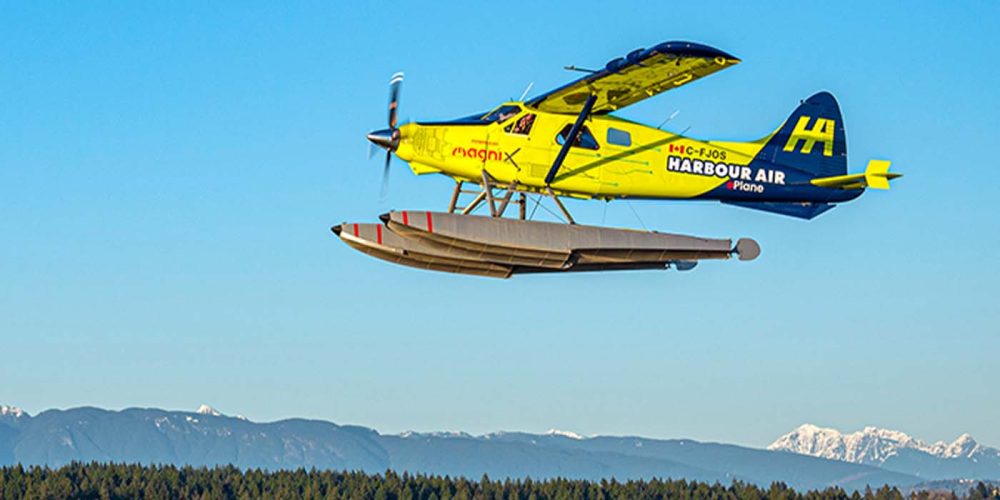Harbour Air successfully completes first point-to-point test flight in all-electric plane
Seaplane airline Harbour Air continues to make progress toward making its entire fleet of planes electric by successfully completing its first point-to point test flight in Canada. The eBeaver electric plane flew 45 miles with plenty of reserve power left when it landed.
Harbour Air began operations in 1982 with two small seaplanes as a service for the forestry industry in British Columbia, Canada, and is now North America’s largest seaplane airline. With over 40 aircraft in its current fleet, the company completes up to 300 scheduled flights per day, including scenic tours and private charters on the West Coasts of Canada and the US.
Harbour Air’s journey toward electrification began in 2019, when it teamed up with electric propulsion systems manufacturer magniX to develop the eBeaver – an electrified version of its six-passenger DHC-2 de Havilland Beaver plane, magnified by a 750-horsepower (560 kW) magni500 propulsion system. Its maiden flight proved successful, kicking off Harbour Air’s quest to become the first fully carbon-neutral airline.
In 2021, H55, experts in aviation-certified modular battery storage and battery management systems, joined the team to provide Harbour Air and magniX with modular battery technology to expand both the eBeaver’s balance to weight ratio and its travel endurance.
At the time, the three teams stated they would continue to develop the technology together while performing test flights with the electric planes in order to seek certification for commercial use.
Most recently, Harbor Air has completed its latest milestone with the eBeaver electric plane.
The eBeaver electric plane / Source: Harbour Air
eBeaver electric plane flies point to point in 24 minutes
Harbour Air recently shared its latest electric plane feat in a press release, detailing the progress of the eBeaver’s latest journey.
The electrified version of a historic De Havilland Beaver plane traveled from a terminal on the Fraser River adjacent to Vancouver International Airport (YVR) and successfully landed in Pat Bay adjacent to Victoria International Airport (YYJ) with “ample reserve power” left.
The distance traveled was 45 miles over the course of 24 minutes, according to Harbour Air. The trip marks the electric plane’s first direct, point-to-point test flight. Harbour Air’s vice president of flight operations and test pilot Kory Paul spoke:
I am excited to report that this historic flight on the ePlane went exactly as planned. Our team as well as the team at magniX and Transport Canada are always closely monitoring the aircraft’s performance and today’s flight further proved the safety and reliability of what we have built.
This latest successful test moves Harbour Air ever closer to completing the certification and approval process with both the FAA and Transport Canada, as well as helping make all-electric commercial planes possible.
[embedded content]
Subscribe to Electrek on YouTube for exclusive videos and subscribe to the podcast.

Seaplane airline Harbour Air continues to make progress toward making its entire fleet of planes electric by successfully completing its first point-to point test flight in Canada. The eBeaver electric plane flew 45 miles with plenty of reserve power left when it landed.
Harbour Air began operations in 1982 with two small seaplanes as a service for the forestry industry in British Columbia, Canada, and is now North America’s largest seaplane airline. With over 40 aircraft in its current fleet, the company completes up to 300 scheduled flights per day, including scenic tours and private charters on the West Coasts of Canada and the US.
Harbour Air’s journey toward electrification began in 2019, when it teamed up with electric propulsion systems manufacturer magniX to develop the eBeaver – an electrified version of its six-passenger DHC-2 de Havilland Beaver plane, magnified by a 750-horsepower (560 kW) magni500 propulsion system. Its maiden flight proved successful, kicking off Harbour Air’s quest to become the first fully carbon-neutral airline.
In 2021, H55, experts in aviation-certified modular battery storage and battery management systems, joined the team to provide Harbour Air and magniX with modular battery technology to expand both the eBeaver’s balance to weight ratio and its travel endurance.
At the time, the three teams stated they would continue to develop the technology together while performing test flights with the electric planes in order to seek certification for commercial use.
Most recently, Harbor Air has completed its latest milestone with the eBeaver electric plane.
eBeaver electric plane flies point to point in 24 minutes
Harbour Air recently shared its latest electric plane feat in a press release, detailing the progress of the eBeaver’s latest journey.
The electrified version of a historic De Havilland Beaver plane traveled from a terminal on the Fraser River adjacent to Vancouver International Airport (YVR) and successfully landed in Pat Bay adjacent to Victoria International Airport (YYJ) with “ample reserve power” left.
The distance traveled was 45 miles over the course of 24 minutes, according to Harbour Air. The trip marks the electric plane’s first direct, point-to-point test flight. Harbour Air’s vice president of flight operations and test pilot Kory Paul spoke:
I am excited to report that this historic flight on the ePlane went exactly as planned. Our team as well as the team at magniX and Transport Canada are always closely monitoring the aircraft’s performance and today’s flight further proved the safety and reliability of what we have built.
This latest successful test moves Harbour Air ever closer to completing the certification and approval process with both the FAA and Transport Canada, as well as helping make all-electric commercial planes possible.
Subscribe to Electrek on YouTube for exclusive videos and subscribe to the podcast.


